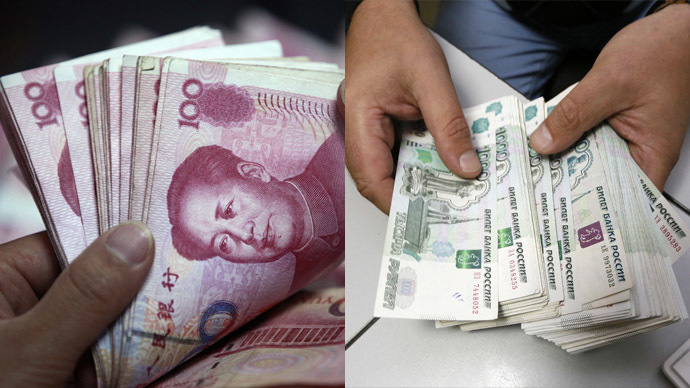Ditching US dollar: China, Russia launch financial tools in local currencies

China and Russia have effectively switched to domestic currencies in trading using financial tools as swaps and forwards, as they seek to reduce the influence of the US dollar and foreign exchange risks.
The agreement signed in the end of October comes into force Monday, December 29, and provides a currency swap of CNY150 billion (up to US$25 billion).
The country’s Foreign Exchange Trade System will carry out similar transactions with the Malaysian ringgit and the New Zealand dollar.
From now on yuan swaps are available for 11 currencies on the foreign exchange market.
“China won’t stop yuan globalization or capital account opening because of the volatility in emerging market currencies,”Ju Wang, a senior currency strategist at HSBC Holdings Plc in Hong Kong told Bloomberg.
China has set up bilateral currency swap lines with more than 20 countries and regions since 2009, including Switzerland, Brazil, Hong Kong, Indonesia and South Korea, Xinhua News reported in July.
A swap is a financial tool to ease transactions by exchanging certain elements of a loan in one currency, like the principal or interest payments into an equivalent loan in another currency.
Currency forward is an obligation of two parties to convert an agreed amount of one currency into another by a certain date at an exchange rate specified at the moment of signing the deal.
Russia and China have long been looking for ways to cut the dollar’s role in international trade. The question is significant for China as 32 percent, or $4 trillion of its foreign exchange reserves are in US bonds, which means there is a vulnerability to fluctuations in the exchange rate.
Russia’s foreign exchange reserves are worth $398 billion, and the US dollar accounts for about $162.45 billion.
The country’s economic growth has slowed amid a standoff with Western countries over the Ukrainian conflict. After the country’s financial sector faced EU and US sanctions it became hard for Russian businesses to raise finance in the West.
Chinese authorities are particularly interested in currency swap lines with developing countries, mainly from the Asia-Pacific region. Australia, New Zealand, Brazil, Singapore, Hong Kong, Argentina, and Malaysia are actively involved in transactions with China.
No comments:
Post a Comment
Comments always welcome!